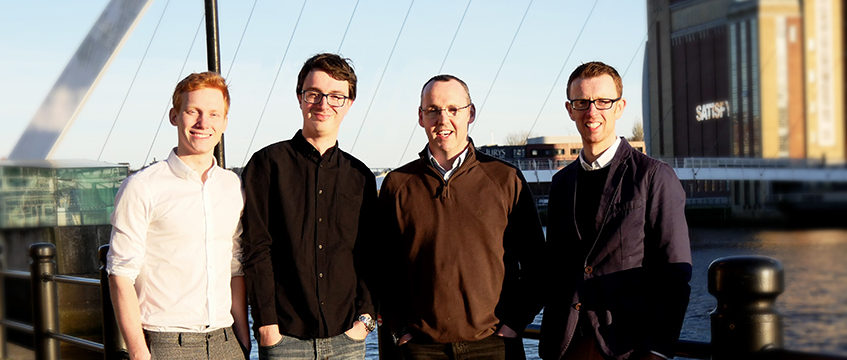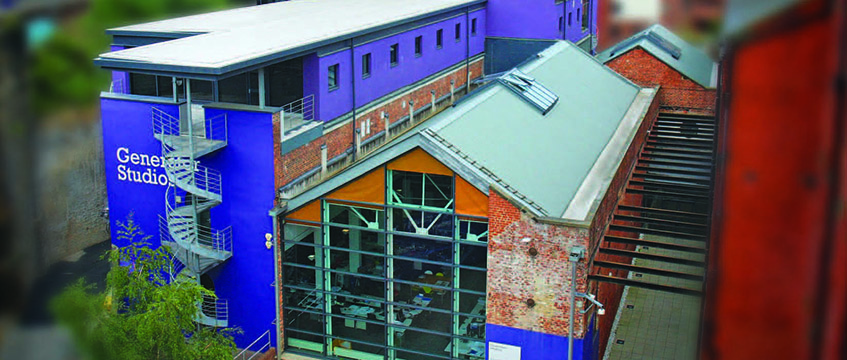A couple of facts you might want to know about Newcastle upon Tyne’s tech sector: it is made up of more than 2,800 companies, including Sage, the FTSE 100’s only software business; and it employs more than 27,000 people.
So much for the maths, what about the people behind the numbers and the creative force behind these businesses? “It seems natural for us to be in Newcastle,” says Jamie Hurst, co-founder of Gateshead-based start-up JimJam, even though he is originally from Sunderland and another co-founder comes from Birmingham.
Not all of the entrepreneurs who now call the capital of the North East home came quite so willingly though. Sarat Pediredla, co-founder of global enterprise app developer Hedgehog Lab, says: “I initially refused to move to Newcastle because I believed there was nothing there for me.”
His change of heart was both good for his business and for the North East because it has now joined the ranks of poster pin-ups for the city along with games developer Ubisoft and 3D visualisation specialist Zerolight. Last year both companies took new offices, the former moving into 30,000 sq ft in Gosforth and the latter 15,000 sq ft at the Live Works building on Quayside.
One of the key moments in Newcastle’s tech scene came in 2011 when a group of angel funders and venture capitalists started an accelerator programme – Ignite – that now also runs in other UK cities. Ignite chief executive Tristan Watson says another 30 companies are likely to go through the programme in the city over the next five years, but adds that he would like support from politicians on issues like transport. “A rail ticket to London [over £200 off-peak and nearly £300 peak-time] is a huge cost for a start-up” he says.
Newcastle tech companies are generally positive about the support they have received locally. One of those banging the drum for the city at MIPIM last month was Catherine Walker, inward investment director at public sector body Newcastle Gateshead Initiative. She says: “We have launched a strategy for the tech sector as we expect it to grow 30% in the next three years.”
That raises the question of where these businesses will be located, especially as expansion at popular co-working spaces like central Newcastle’s Campus North is unlikely. A local authority-commissioned report last summer suggested an additional 274,000 sq ft in Newcastle and Gateshead will be required before 2020.
Newcastle city council’s local economic development officer Ed Banks says: “This will be a combination of new building and renovation of existing stock, and it won’t all be public sector.”
That may be no bad thing, as some commentators wonder whether current resources for tech firms are too widely dispersed. Jonathan Sapsed, professor of innovation and entrepreneurship at Newcastle University Business School, says: “There is too much focus on starting new projects [because that is an easy indicator to hit] and not enough on supporting companies already up and running.”
That view is mirrored by Simon Hanson, North East development manager at the Federation of Small Businesses. He says: “The trouble with public funding is that there is a push to hit outputs rather than look closely at outcomes. There is definitely support, though whether it is appropriate for all tech companies is questionable.”

It’s physio, Jim, but not as we know it
Technology may not yet have advanced far enough for us to physically beam ourselves up to a physiotherapist when we need one, but it has progressed to the point where we can do the next best thing: beam an image of ourselves to a clinical specialist.
That is the service provided by JimJam – a web-booked video-chat consultation with a chartered physiotherapist, who can issue a self-treatment plan, including online videos and progress log.
While the therapy community may be divided about the efficacy of virtual treatments, the team behind JimJam was more certain about where to base the business, which has now been running six months from 450 sq ft in local authority-run Gateshead International Business Centre. The space, on the south bank of the Tyne, may be functional rather than hipster chic, but it is affordable.
Although the founders were already based in the Gateshead centre, working on different projects, the decision to locate the start-up there was not straightforward.
“We spent a ridiculous amount of time looking at places across the Tyne, but couldn’t find anything better,” says JimJam’s chief technical officer Jamie Hurst. “It will be very difficult to move anywhere else because there is a positivity here that is hard to put into words.”
Nevertheless, if the company expands from the current team of six, as it expects to, then the search could resume when the existing 12-month lease expires this autumn.
“We might move to central Newcastle as there is a certain amount of prestige that goes with an NE1 address,” says Hurst.
’Appy in Newcastle
With offices in the US, India and Denmark, seven-year-old app developer Hedgehog Lab is certainly going places, though co-founder Sarat Pediredla is adamant that the Newcastle HQ won’t move away from its birthplace.
The global headcount is soon expected to reach 110, meaning a doubling of space in its hub at Newcastle’s Generator Studios. Even so, Pediredla has kept things lean – the current offices total just 4,300 sq ft. “I actually started in South Shields, then moved to Gateshead, then Byker, before arriving at the studios,” he says.
Pediredla, who originally came to the UK to study in Southampton before moving to work in London, acknowledges the importance of the capital for tech businesses, but reckons that a combination of high calibre graduates, a healthy start-up culture and investment from local government mean that those who choose to operate from Newcastle are better supported than ever before. “I very frequently fly clients here,” he says, as 95% of Hedgehog’s clients are from outside the North East.

The property perspective
Central Newcastle’s Generator Studios was originally designed for construction-related businesses, but over the past few years the 42,000 sq ft building has instead attracted tech firms like Hedgehog Lab. Encouraged by this, landlord Metnor is planning an out-of-town version at Balliol Business Park, four miles north of the city centre.
Metnor investment director Jamie Mableson says: “We have started refurbishing 30,000 sq ft and aim to make it look a bit different with exposed services.”
It is a bold move, but a shortage of this kind of space means it could pay off. Knight Frank partner Patrick Matheson says: “What we particularly struggle with in Newcastle is follow-up space for start-ups. Most of what is available isn’t
the office spec and style they crave.”
Because much future activity is likely to focus on refurbishment of historic buildings, landlords should ensure they put in the best IT possible, says Chris Pearson, partner at Gavin Black & Partners. “Universities are producing some very savvy graduates and they will expect employers to deliver IT standards of the highest order,” he adds. “This will be pivotal in letting space too.”











